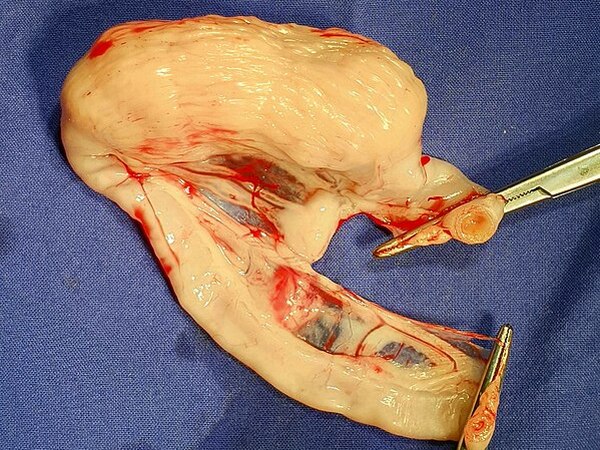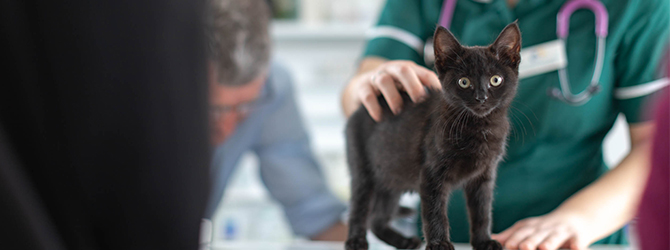Lymphoma in cats
Lymphoma is one of the most common cancers in cats and can affect younger cats as well as more senior felines.
It has multiple different forms, and so the symptoms can vary from gastrointestinal signs to kidney failure to breathing difficulties. It is often treated with chemotherapy, but the success rate is very variable.
Key takeaways
- Lymphoma can affect various organs, with symptoms ranging from upset stomachs and breathing problems to kidney issues.
- It mainly appears as gastrointestinal issues in older cats, while younger cats often face chest-related lymphoma linked to feline leukaemia virus (FeLV).
- To diagnose lymphoma, vets use tests like biopsies and scans, then treat it with chemotherapy tailored to the cancer's severity.
- Life expectancy for cats with lymphoma can differ greatly.
What is lymphoma in cats?
Lymphoma is a cancer of a type of white blood cell called lymphocytes. It is one of the most common forms of cancer seen in cats. Lymphocytes travel around the body, fighting infection and disease, so this cancer can affect many parts of the body.
What causes lymphoma in cats?
Defects in the origin cells often cause cancers, but the exact cause of feline lymphoma is unknown. However, there is a strong link between lymphoma and feline leukaemia virus (FeLV), and scientific research has also pointed to a link between malignant lymphoma and tobacco smoke through passive smoking.
Types of feline lymphoma
As lymphocyte cells travel all around the body, there are a few different presentations of this cancer in cats.
Intestinal
Gastrointestinal lymphoma in cats is the most common form, making up 50-70% of cases. It is most often seen in older cats over nine years old.

Image of High-grade Lymphoma. © Kalumet. Photo by Kalumet. Source
Mediastinal lymphoma
More often seen in young cats, mediastinal lymphoma affects lymphoid organs in the cat’s chest, such as the lymph nodes and thymus. This type of lymphoma is strongly associated with feline leukaemia (FeLV).
Renal
Lymphoma of the kidney (renal lymphoma) is also associated with FeLV, although less strongly.
Multicentric
This is a less common type of lymphoma, involving lymph nodes around the body.
Symptoms of lymphoma in cats
As lymphoma can affect different organs, the different types can cause different signs and symptoms. So, what are the first signs of lymphoma in cats?
Intestinal
This common type often presents with weight loss, appetite change, vomiting and diarrhoea. It is difficult to know if gastrointestinal lymphoma in cats is painful, but some patients do seem to have abdominal discomfort: they may seem uncomfortable when resting or eating, or become aggressive when stroked on the tummy.
Mediastinal
As this type of cancer affects the chest, affected cats can show difficulty breathing. Fluid accumulates around the lungs, making it hard to breathe easily. Affected cats may breathe heavily or start open-mouth breathing with increased rate and effort.
Renal
In renal lymphoma in cats, the normal kidney cells are gradually replaced by cancerous ones, leading eventually to kidney failure. This produces signs such as drinking and urinating more, appetite loss, weight loss and vomiting.
Multicentric
As the lymph nodes are affected, they appear as large, hard lumps. Other symptoms include lethargy and weight loss.
How is lymphoma in cats diagnosed?
If you notice any of these symptoms or your cat appears unwell at all, it is recommended that you take it to the vet for a health check. Your vet may run a variety of tests, including biopsies of any lumps, blood and urine tests, X-rays, and ultrasound scans to reach a diagnosis. A test for feline leukaemia virus will often be suggested, as the two diseases are sometimes linked.
Once a diagnosis is reached, your vet will classify the lymphoma both by type, but also by how aggressive it is. High-grade lymphomas are those in which the cancerous cells are rapidly dividing and spreading through the body, whereas low-grade lymphoma is slower acting.
Treatment for lymphoma in cats
Lymphoma is usually treated with chemotherapy. Depending on the type and grade of the cancer, differing protocols may be used with multiple combinations of drugs. These may be oral tablets or injections.
Cats tend to tolerate chemotherapy better than humans, with less severe side effects. However, undergoing this treatment is fairly intensive, with lots of vet trips and blood tests, which some patients may find very stressful.
Life expectancy of cats with lymphoma
The prognosis and survival time for patients with feline lymphoma is variable.
Cats with low-grade lymphoma which responds well to chemotherapy may achieve remission, where the signs of cancer are undetectable, and have a life expectancy of 2 - 3 years. Sadly, the response to treatment for many high-grade lymphomas is much less, with some not responding to treatment at all, and others only achieving a few months of remission.
Need more info?
For more advice on lymphoma, have a chat with your local vet.
Find your nearest vet using our find a vet page, or speak to a vet online using our team of experienced video vets.



